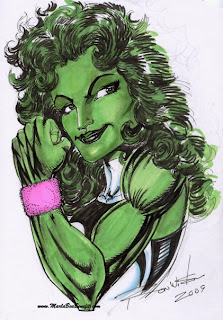“But I’ve always been like this,” says the man.
“It is unacceptable to the church,” says the monk.
The punch line of this comic strip, which hangs on the door of the office next to mine, is that the layman is not, as the narrative hints, gay. Rather, he is left-handed. The implied commentary is that Christianity’s condemnation of homosexuality is equally ridiculous as its earlier condemnation of left-handedness.
While the comic strip is set in what appears to be medieval times, the situation it depicts is much less antiquated than that. Both of my grandmothers were naturally left-handed. Both were converted in grade school to writing with their right hands, and they spent the rest of their lives passing as right-handed. My father’s mother wanted me to be similarly converted; I remember her exhorting me to color with my right hand when she would babysit me, until my right-handed parents told her to cut it out.
I really like the comic strip because I have always felt that the gay and the left-handed were natural compatriots. We are a similar sort of minority, a minority based on an unusual behavior or preference rather than something visual like race or cultural like religion. We are aberrations that pop up within a family, whereas most other minorities are raised in a family of others like themselves.
For those whose gayness or left-handedness revealed itself at an early age, both conditions have been attributed variously to genetics, hormone exposure in the womb, and early childhood influences, though none of these connections can be proven absolutely. And just as homosexuality can, for many people, be a conscious choice made in adulthood, so left-handedness can be learned by those not naturally inclined towards it, generally because someone lost the use of his or her right hand.
This issue of innate characteristic versus choice is a high-stakes debate where homosexuality is concerned. George Lakoff points out that liberals tend to see homosexuality as a genetic fact, while conservatives tend to see it as a choice. I ask my students why this would be, and they always figure it out right away:
If something is a choice, then it can be a wrong choice.
I always think the entire premise of the debate is odd, because I have met many gay people who have known they were gay since their earliest memories, and many others who made conscious decisions to become gay in their twenties and thirties because they felt logically that they would have better relationships with people of their same gender (though yes, predictably, these were all women).
Ultimately, whether it is an innate behavior or a conscious choice doesn’t really matter; what matters is that everyone should have the right to do what is most comfortable or desirable for them, as long as it doesn’t hurt anybody else.
I first discovered being left-handed was an identity category, and an abnormal one, when I joined my first-grade class, a week after school had started (I had been moved from a different class).
“Are you right-handed or left-handed?” the teacher asked me in front of all of my new classmates, immediately after introducing me.
I must have looked confused, because she clarified: “Which hand do you write with?”
I thought about it for a moment and then raised my left hand.
“Great,” she sighed, her voice annoyed. “You’re the only one. Now we’re going to have to order you some scissors.”
Throughout grade school, I faced similar minor persecutions. I was chastised constantly for my poor handwriting, my inadequate scissor-handling skills, my difficulty mirroring moves in gym class that were modeled by a right-handed teacher. In sixth grade, we were required to write in-class essays in erasable pen, which is impossible for left-handed people such as myself, who, due to the enforcement of right-slanting letters in our remedial cursive classes, write with our hands curled above the pen, thereby smearing the runny ink all over the pages and our hands. In what I still think was a really masterful stroke of smart-assed passive aggressiveness, I learned to write upside-down for these in-class essays, a skill I still have to this day.
These inconveniences were small, the same kinds of little indignities that all kids face, but they reinforced the idea that being in the minority was something to minimize, to work around, to avoid inconveniencing others with. As an adult, I have seen so many left-handed people try to learn to kickbox right-handed because they did not want to keep asking for special explanations of how to do things. It seemed easier to just do what everyone else was doing. Some of those people, like me, had teachers who caught their deception and forced them to train left-handed; others trained for years in a less-comfortable stance before attempting to retrain themselves as southpaws.
These kickboxers make me think of my grandmothers spending their entire lives writing with their less-coordinated hand. I think of all the gay people forced to pass as straight through the ages, those who got married and carried on affairs on the side, or perhaps just dreamed of it. I think of all the left-handed people writing and working and doing sports with their non-dominant hands, and how many never reached their full potential as athletes and artisans and even writers because they could not use their more-skilled hand.
The needs of minorities are always seen by the majority as frivolous and inconvenient, whether they are needs for political representation, needs to read about people like ourselves in school, needs to be able to marry our life partner of choice, or even just needs for scissors that have the left blade rather than the right blade on top. We need to stand up for people’s rights to have these needs met, especially when we find ourselves in the majority, when it would be easy enough not to care.




